So, it is the same as other products mentioned before. You're not getting about 0.23mg of elemental Lithium, as you said. You're getting 5 mg elemental Lithium, IMO.
Lithium Orotate is the elemental Lithium bound to Orotic Acid.
from: _
https://www.balancingbrainchemistry...-and-Depression/Lithium-Orotate-Dosages-.html
Lithium-carbonate contains 18.8% of elemental lithium
Lithium-orotate contains 3.83% of elemental lithium
from:_
Low-Dose Lithium: An Effective Treatment for Mood Disorders
- Lithium carbonate: 300 mg (containing 56 mg of elemental lithium)
- Lithium carbonate: 150 mg (containing 28 mg of elemental lithium)
- Lithium carbonate: 25 mg (containing 5 mg of elemental lithium)
- Lithium orotate: 120 mg (containing 5 mg of elemental lithium) (4.2%)
- Average dietary intake of elemental lithium: 1 mg/day
- Average intake of elemental lithium when added to ground water: 5 mg/day
Interesting article from Jefferey Dach _
Lithium Orotate the Great Protector
(lots of references in the articles on the web page)
Lithium Orotate, the Great Protector
A few years back I learned about Lithium Orotate from Jonathan Wright’s newsletter which disclosed he personally takes lithium for neuro-protection. I was very impressed by this, so I started lithium myself, and incorporated the mineral into our treatment program at the office.
Houston, We Have a Problem
I quickly discovered a problem. Every time I mentioned the word lithium to anyone at the office, they make an unpleasant face, wrinkle up their nose and start heading for the exit door. Why? Perhaps it’s because most people associate Lithium with mental illness, and a prescription drug called Lithium Carbonate used for bipolar disorder. That is the great mistake. We don’t use that form of lithium.
Differences Between Lithium Carbonate and Lithium Orotate
Dr Wright is not taking prescription lithium carbonate. He is taking lithium orotate, a non-prescription nutritional supplement. A big difference between the two types of lithium is the dosage. Prescription lithium carbonate comes in 300 mg tablets, and the dosage is 3-6 tablets a day equal to 900 to 1800 mg per day. Non-prescription Lithium orotate comes from the health food store in 5 mg capsules, and people usually take one or two caps, one to three times a day (5-30 mg/day) depending on how they are feeling.
Another difference is the high dosage of lithium carbonate requires periodic blood testing for lithium toxicity. However, for the low dose lithium orotate, no toxicity or blood testing is required. That’s one of the reasons it is so safe. That is why we use the safer, non-prescription Lithium Orotate, sold as a nutritional supplement at the health food store.
Lithium Carbonate, Carrie Matheson (Claire Dane) in Homeland
We are all familiar with lithium carbonate as a psych med thanks to the popular TV series, Homeland, staring Clare Dane as Carries Matheson, the “Bipolar Super-Hero”. The TV series sensationalizes Bipolar Disorder in which Carrie Matheson, a CIA operative, alternates between a “manic state” and a “depressed state”, taking Lithium Carbonate to stabilize her moods. At certain times, she will “go off” her medication to induce a “manic state”, during which she experiences almost superhuman mental abilities to solve spy plots and intrigues, beyond the abilities of “normal” people.
This is lithium carbonate the psych med. We don’t use this. We use the vitamin form called lithium orotate, a safe nutritional supplement sold at the health food store. (1-6)
Lithium Carbonate the First and Best Psych Drug that Actually Works
Regular readers will know I am not a fan of psychiatric medications, as most of them are ineffective, useless and produce horrific adverse side effects. Although current day anti-psychotic drugs such as Haldol, Prolixin, Resperdol, Seroquel, Zyprexa etc. may serve as chemical lobotomy or chemical straight-jacket for the criminally insane, they are inappropriate for children and other victims of the medical system who make the mistake of expecting help with mood or emotional problems.
Instead of receiving an understanding word and a compassionate pat on the back, these patients are transformed into victims of medical iatrogenesis, caused by adverse effects of psych drugs such as tardive dykinesia, akasthesia, and generalized brain damage.
The Origins of Psychiatry 1949
However, Lithium Carbonate is the exception here. Although overdose can lead to toxicity, when used properly, lithium carbonate is remarkably safe, and effective. The origin of modern psychiatry can be traced back to
John Cade’s 1949 Lancet article, in which he recognized Lithium as an effective treatment for manic psychosis. Lithium Carbonate has a long track record as effective treatment for bipolar disorder and serves as mood stabilizer. The take home message here is that if you have a friend or loved one with bipolar disorder, lithium carbonate is the drug of choice.(10-21) Although lithium carbonate is an old drug, it is far superior to modern day psych meds.
Reduction in Suicides, and Violent Crime with Lithium in Water Supply
Lithium is a naturally occurring mineral found in our water supply. If high dose lithium is useful as a psych med, what about low dose lithium in our water supply. Does that have any effect on the population?
This question was answered by Dr. Schrauzer in a 1990 report.(27)
Using public data for 27 Texas counties from 1978-1987, Dr. Schrauzer showed the incidence rates of suicide, homicide, and rape are significantly higher in counties whose drinking water have little or no lithium, compared to counties with higher lithium levels in the drinking water (70-170 mcg/L) . (27) Dr Schrauzer even proposed adding lithium, “lithiation” of the drinking water, as a public health measure: (27)
These results suggest that lithium at low dosage levels has a generally beneficial effect on human behavior, which may be associated with the functions of lithium as a nutritionally-essential trace element. Subject to confirmation by controlled experiments with high-risk populations, increasing the human lithium intakes by supplementation, or the lithiation of drinking water is suggested as a possible means of crime, suicide, and drug-dependency reduction at the individual and community level.
Dr. Schrauzer performed another low dose
lithium 1994 study. This time, twenty Four subjects were randomly divided into two groups receiving either placebo or a
400 micro-gram lithium tab daily for 4 wk. (26). The author concluded that
“lithium at the dosages chosen had a mood-improving and -stabilizing effect.”(26)
Additional study from Japan showed higher lithium levels in the water supply were associated with less suicide risk, and reduced over-all mortality in that population.(28-30)
If there were any doubts, a
repeat study done by Dr Kapusta measured drinking water lithium levels in 99 Austrian districts correlated with suicide rates. The study was published in the April 2011 British journal of Psychiatry showing suicide rates vary inversely with lithium levels in local drinking water. (33)
Finally, confirmation of the original Texas study was done by Dr Bluml in 2013 with state-wide sampling of lithium levels in the drinking water relative to suicide rates in 226 Texas counties. Again the authors found an inverse correlation between lithium levels and suicide rate indicating benefit of lithium in drinking water. (34)
This is the end of part one. In
part two we examine the neuro-protective and anti-aging effects of low dose lithium.
Lithium Orotate:
Buy at Pure Encapsulations.
Jeffrey Dach MD
7450 Griffin Road Suite 190
Davie, Fl 33314
954-792-4663
Lithium Orotate NeuroProtection Part Two
Posted on
December 21 2015
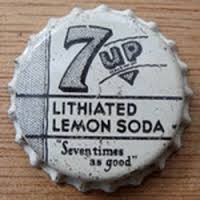 Lithium Orotate NeuroProtection Part Two
Lithium Orotate NeuroProtection Part Two
by Jeffrey Dach MD
In part one, we discussed the differences between lithium carbonate, a prescription psychiatric drug, and a different version called lithium
orotate. Unlike lithium carbonate, the lithium
orotate is a safe nutritional supplement available without a prescription at the vitamin store. In Part Two, we review lithium as a neuro-protective agent. Link to
Part One. Left image: Bottle Cap lithiated soda pop courtesy of Adam Clark Estes Factually Gizmodo.
Add Lithium to My Soda Pop, Please
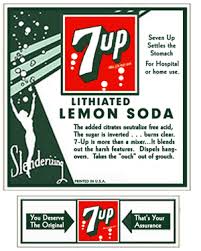
In 1929, a new soda pop was introduced, lemon lime soda containing lithium citrate invented by Charles Grigg. This lithium containing drink was marketed as a cure for post alcohol Hang-Overs. Their marketing slogan was “Take the Ouch out of Grouch”. Later, when this lithiated soda pop was renamed 7-Up, it really took off and became a commercial success. Many other lithium containing beverages were popular during this era with names like “Wake-Up”, “Heads Up” and “B1” (thiamine B1 was added). However, in 1948, 7-Up was reformulated without the added lithium and lithiated soda pop was removed from the market.(31-33).
Left Images courtesy of 7-UP.
Another Medical Dogma Dies
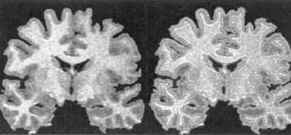
In the 1970’s, I learned in medical school the prevailing dogma that our brain cells start with a fixed number at birth which gradually declines as we age. Unlike other parts of the body which regenerate new cells, the brain is unable to replace lost or damaged brain cells. Or so we thought. Like many other discarded medical dogmas, this one has also fallen by the wayside. Just like other areas of the body, the brain also makes new brain cells. In the 1990’s, newer imaging techniques revealed neurogenesis in the hippocampus and olfactory bulb, specific areas of the brain where new cells are generated.(19-20)
Left upper image MRI of brain for measuring grey matter volume courtesy of Wayne State University School of Medicine Dr Moore, October 7, 2000, The Lancet.(5)
Lithium and Neurogenesis in the Hippocampus
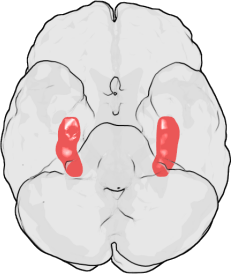
Research over the last decade has revealed that lithium’s effects as mood stabilization and regeneration of new brain cells (neurogenesis), are mainly due to the inhibition of a key enzyme called GSK-3β, glycogen synthase kinase-3β. (1) This GSK-3B, in turn, upregulates insulin-like growth factor-I (IGF-I), and
brain-derived neurotrophic factor (BDNF) which stimulates n
eural stem cells to give rise to new hippocampal neurons throughout adulthood.(1) Thus, the molecular pathways of how lithium increases new brains cells has been worked out by basic science.
Left Image: Location of Hippocamopus in human brain courtesy of wikimedia commons.
Lithium Increases Size of Hippocampus
One of the surprising findings in Bipolar Disorder recently made visible by new MRI brain imaging techniques is the loss of hippocampus neurons, and loss of brain volume characteristic of Bipolar disorder. This is also replicated in a mouse model of bipolar disorder in which GSK-3B is upregulated in genetically altered mice. These mice exhibit manic behavior and loss of brain volume which is reversed by lithium treatment.(7-8).
Neurotrophic Theory of Depression
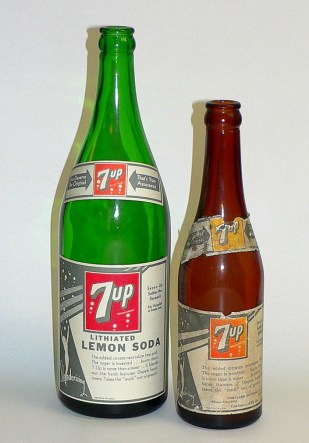
Lithium prevents and reverses the loss of brain cells in Bipolar Disorder humans as demonstrated by MRI brain imaging studies. Brain volume increases after lithium treatment.(5-6)(9-10) Similar increases in brain volume have been seen with SSRi antidepressant drugs, suggesting a common mode of action with Lithium. This has launched the “neurotrophic theory of depression”.(21-23) This idea is new and may replace the older theory of neurotransmitter imbalances as a cause of depression. The Neurotrophic theory says that clinical depression is caused by reduced or absent brain neurogenesis, rather than chemical imbalances in the brain. The brain cannot make new cells. Lithium and SSRI antidepressants (24) increase these neurotrophic factors (by inhibiting GSK-3B) thus up-regulating neurogenesis in the hippocampus (26-29).
Left Images:Seven-Up bottles lithiated lemon lime courtesy of Print MAg.
Lithium in Parkinson’s and Neurodegenerative Disorders and Traumatic Brain Injury,
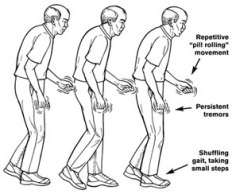
Dr’s Lazzara and Kim reported in 2015 that lithium could potentially halt or reverse the neurodegeneration in Parkinson’s Disease(4) and in Alzheimer’s Dementia.(2-3) Lithium was also found protective in stroke and traumatic brain industry animal models models.
Left image: Parkinson’s Disease
Lithium for Alzheimer’s
In a 2014 report, Dr Trujillo-Estrada laments that there is no effective treatment for Alzheimer’s dementia.(11) Dr Trujillo’s group studies the beneficial effects of lithium in a genetically modified mouse model of Alzheimer’s in which the mice exhibited ”
prominent amyloid pathology along with a selective and significant neuronal loss in the hippocampus and entorhinal cortex.” The authors found less toxic plaque formation in the brains of lithium treated mice with improved memory function compared to placebo treated mice. The authors thought this was highly significant for Alzheimer’s Disease prevention, early treatment with lithium arrested neuron cell loss in the hippocampus and (olfactory – entorhinal cortex) in this mouse model.
Lithium for Traumatic Brain Injury
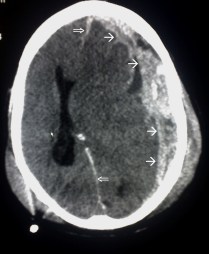
There are about 1.7 million people in the US with traumatic brain injury. Traumatic brain injury is considered a “signature wound” for returning military personnel fighting modern warfare. (13)
Left Image Traumatic Brain Injury CAT Scan showing left subdural hematoma (arrows) Courtesy of wikimedia.
In 2014, Dr. Peter Leeds reviewed the neuroprotective effects of lithium in humans, and explored lithium neuroprotection in the mouse model of traumatic brain injury.(13) Dr Leeds summarizes his exciting finding here:
“Lithium demonstrated robust beneficial effects in experimental models of Truamatic Brain Injury (TBI). These include decreases in TBI-induced brain lesion, suppression of neuroinflammation, protection against blood-brain barrier disruption, normalization of behavioral deficits, and improvement of learning and memory, among others. ” (13)
Below chart: Lithium neuroprotection in traumatic brain injury.courtesy of Peter Leeds Lithium in traumatic brain injury.
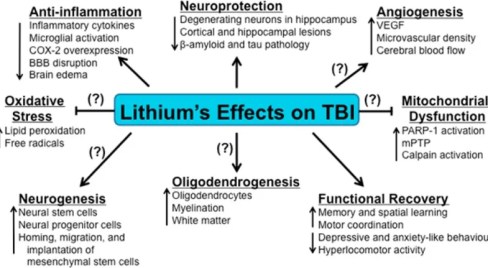 Lithium in Stroke and Brain Ischemia Models
Lithium in Stroke and Brain Ischemia Models
In an 2007 animal study of brain ischemia, Dr Yan reports lithium facilitated recovery of brain functions like spatial learning and memory in mice after cerebral ischemia caused by 15 minutes of carotid artery occlusion. (28) The authors state:
“These results suggest that lithium up-regulates the generation and survival of new-born cells in the hippocampus ….and improves the behavioral disorder in rats after transient global cerebral ischemia.”(28)
Lithium – Why Isn’t Everyone Taking It ?
Conclusion: The body of evidence for the neuroprotective benefits of lithium is now overwhelming. Considering what we know about lithium, the only question I have is, “
Why isn’t everyone taking it?” Again, I would suggest using the over the counter mineral form of lithium called lithium orotate. This is a nutritional supplement sold as capsules at most health food stores, previously available as a lemon soda pop called 7-UP.

 drjohnday.com
drjohnday.com









